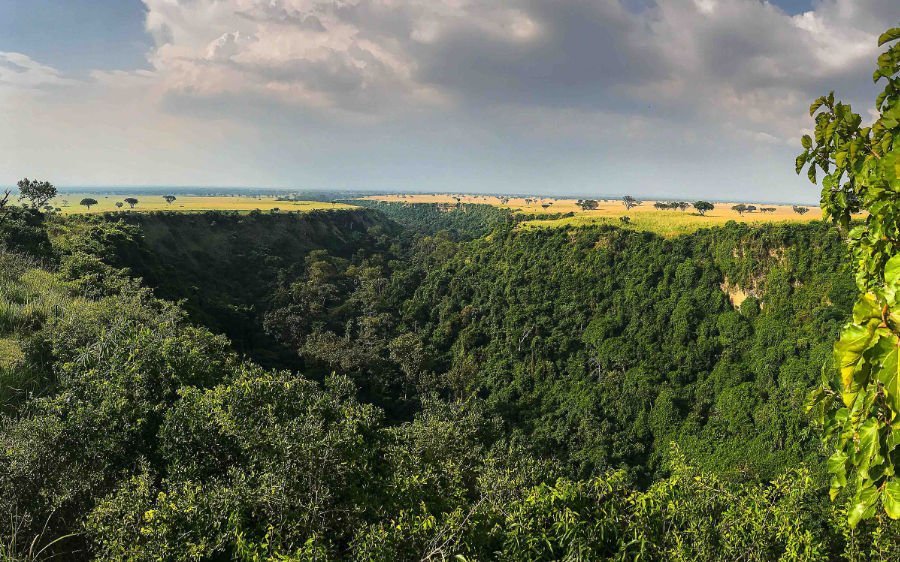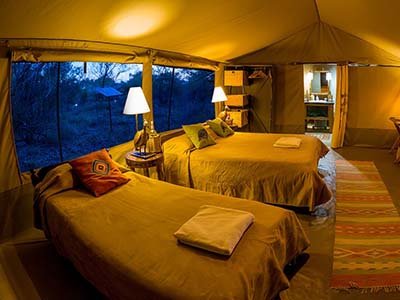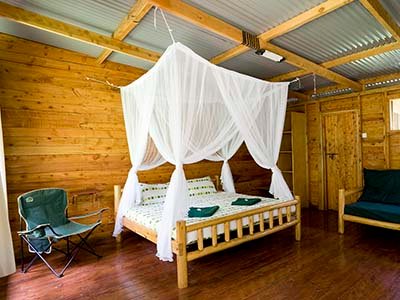Chimpanzees are the closest living relatives of humans, and they provide a fascinating experience for visitors. The chimpanzee trekking experience is a must-do for visitors to Uganda. These primates share 98% of their DNA with humans and are the closest living relatives we have on earth.
The Uganda Wildlife Authority and the Jane Goodall Institute launched a chimp habituation program for ecotourism activities at the Kanyanchu Tourist Centre in Kibale National Park in 1997. Chimpanzee trekking in Uganda as a tourism activity has progressively evolved over the years, and Kibale National Park is currently the greatest spot for chimpanzee trekking. The other destinations in Uganda where chimpanzees have been habituated are Budongo forest, Kyambura gorge in Queen Elizabeth National Park, and Kalinzu forest also near Queen Elizabeth National Park. These locations also provide opportunities for trekking.
Attempts have been undertaken to habituate the Semuliki Wildlife Reserve’s savanna Chimpanzees, but no success has been observed after more than 15 years.
Chimpanzees in the Wild in Uganda
Due to the significant population declines in the areas where they are found, chimpanzees are considered to be endangered worldwide. This reduction is mostly the result of habitat destruction and the trade in bushmeat. Because Ugandans don’t often eat primate meat, the chimpanzee population there is regarded as being less at risk from hunting than that of other African countries. However, they sometimes fall victim to human-wildlife conflict in several areas of their range in this nation. Habitat loss is a problem, but it mostly happens outside of protected areas. Because of this, many of the dangers to chimpanzees arise on the outskirts or outside of protected areas. They are impacted by local farmers in this area as well as large-scale businesses that grow tobacco, cocoa, and sugar cane
In addition snares placed for other animals like bushpigs and antelopes pose a greater threat to the chimpanzees in Uganda. At least 25% of habituated chimpanzees in Uganda have damaged limbs.
Chimpanzee trekking in Kibale National park
Kibale forest is the best destination for chimpanzee trekking or tracking in Uganda. It is the best place in Africa, and arguably the world, to trek chimpanzees in their natural habitat. The park is home to over 1,500 chimpanzees and 12 other primate species including Guereza Colobus( Black and white colobus monkey), Blue Monkey, Uganda Red colobus, Red-tailed Monkey, Grey-cheeked Mangabey, Vervet Monkey, Olive Baboon, Lhoesti or Mountain Guenon, Dwarf Bushbaby, Bosman’s Potto, Eastern Needle-nailed bushbaby, and the newly described Dwarf Galago. Overall Uganda has 24 recorded primate species full list Primates of Uganda
Chimpanzee tracking, or trekking, is done on foot, using a network of trails through the forest. During these treks, you have the chance to observe various primate species as well as many different birds and butterflies. Even if you don’t spot any chimpanzees, the experience of walking through this majestic rainforest is unforgettable.
Chimpanzee habituation is the process where chimps are prepared to get accustomed to humans for tourism. The process takes several years in some areas depending several ecological and logistical factors. Once chimps are habituated, they can be easily approached, but they remain wild. Guides are needed to help in tracking chimpanzees, explain their ecology, and also protect tourists from other wild animals, especially the forest elephants, which are common in Kibale Forest.
There are two types of chimpanzee tourism products open for tourism in Uganda:-
Chimpanzee tracking, or trekking: This is the most chimp activity and Kibale National park is world reknown and a premeir chimp tracking destination. Depending on the location of the animals on a given day, a trek might span anywhere from two to five hours. Tourist groups of no more than six people are limited to one hour per group while visiting the chimpanzee groups.
Chimpanzee trekking in Kyambura Gorge, Queen Elizabeth National Park
The only area in the Queen Elizabeth Conservation Area where habituated chimps may be observed is in Kyambura Gorge. The chimps in Kyambura Gorge were isolated after the forests that connected it to the bigger forests of Kalinzu and Maramagambo were lost due to deforestation.
The group in the gorge now consists of approximately 20 members, which is a tiny number, and conservationists are concerned that this may lead to inbreeding and mutations.

Kyambura Gorge | Queen Elizabeth National Park, Uganda
The chimp trekking in Kyambura Gorge is separated into two sessions: morning and afternoon. A normal trekking day includes 8 people in each session. Only 16 people are allowed each day. Due to the limited number of chimpanzee permits, travellers must get them early enough from Mweya, where the park headquarters are located. Each chimp trekking adventure begins with a briefing for all trekkers, during which rangers explain the characteristics of the terrain as well as facts on the chimps and what to anticipate. Following the briefing, tourists are escorted down the forest to track the chimpanzees. The odds of detecting the chimps are around 88%.
Visitors may see the “underground forest” (the forest growing in the gorge) as well as birds and smaller primates while tracking chimpanzees.
Chimpanzee Trekking in Budongo Forest
Budongo Forest, part of the Murchison Falls National Park, is another place in Uganda where one may go for chimpanzee trekking.
The Jane Goodall Institute has habituated the Kaniyo-Pabidi community, making it the most approachable community for visitors. This community is relatively peaceful and has grown accustomed to the presence of researchers, thus making it a good choice for film crews. The community has been featured in several Netflix natural history documentaries. As of 2022, the chimpanzee permits cost $120.
The Sonso community has been continually researched since 1990. They are said to number over 200 people and are distinguished by their distinctive tool-using habits.
The Waibira community, widely renowned for its hunting and meat-eating habits, was habituated in 2011. Both native chimps and former Sonso immigrants make up the Waibira community.
Chimpanzee trekking in Kalinzu Forest
How to Prepare for a Day of Chimpanzee Trekking
Prior booking for chimpanzee trekking is required, and this is done at the Uganda Wildlife Authority headquarters in Kampala. Your travel agent can assist you, but internet booking and payment are other options.
To have a better Chimp trekking experience, bring a raincoat, sunscreen, sunglasses, bug repellent, and water with you. Pack lunch and snacks for the day as well.
Chimpanzee experience at Ngamba Island Chimpanzee sanctuary
Chimpanzee Trekking in Uganda – What to expect
Before entering the jungle, an armed ranger guide will accompany you to defend you from any potential animal attacks. This is one of the reasons why one of the chimp trekking guidelines is that you should never enter the jungle without a ranger guide.
Chimpanzees, like humans, snap when they are provoked; avoid irritating them during chimp briefing. They enjoy hooting loudly when something is wrong with them. Never feed the chimps when you meet them to make a clear divide between humans and chimps.
The precise time of the finding of Chimpanzees is determined by the forest surroundings, conditions, and chimp food supply. However, it is estimated that finding them will take at least two hours.
If the habituated community is attacked by a wild chimp group, they escape far into the bush. When a member of the group dies, chimps mourn in the same way that humans do. They are calmer and are not on the lookout for outsiders.
Rules of Chimpanzee Trekking in Uganda
- Before the day of chimp habituation, you must be completely inoculated against Covid-19 and any other infectious diseases. For confirmation, a certificate must be provided.
- Do not leave any wraps in the forest since they change the ecology of the forest, which is the only food source for chimps.
- Do not eat in front of the chimps since they may forcefully take it from you. Furthermore, they are wild creatures that must forage for themselves.
- If you need to defecate, ask your ranger guide to dig a hole approximately 30 meters deep and cover it completely. This is done to maintain adequate forest hygiene and to deter chimps from becoming interested about what is buried.
- Never provoke the chimps because they can charge in the same way that people do.
- The minimum age for Chimpanzee trekking is 12.
- When you find the chimps, keep a distance of around 8 meters between you and them to allow for better observation and to decrease the possibility of infecting them.
- Do not enter the forest for habituation without a ranger guide since they are more familiar with the area and have a better understanding of the chimps’ behaviour.
Cost of the Chimpanzee trekking Permits
Kibale and Queen Elizabeth National parks

FAQs on Chimpanzee trekking in Uganda
What is the Best time to go Chimpanzee trekking.
Chimpanzee trekking vs Gorilla Trekking which is better.
How risky is chimpanzee trekking?
Chimpanzee trekking safaris may be an exciting and one-of-a-kind experience, but safety considerations must be taken into account. First, ensure that the safari company you choose has a solid reputation for offering safe and compassionate experiences for chimpanzees and people alike. It is also prudent to be cautious of your personal safety throughout the trek and to adhere to your guide’s advice and standards. This may include maintaining a safe distance from the chimpanzees, avoiding rapid movements or loud sounds, and not carrying objects that may attract them.
Additionally, it is essential to remember that chimpanzees are wild creatures that may be unpredictable, therefore it is essential to constantly be prepared for any dangers. A chimpanzee trekking safari may be a safe and enjoyable experience with the proper safeguards and a trustworthy safari company.
And it is always essential to get travel insurance before embarking on a safari due to the inherent dangers of safaris.




